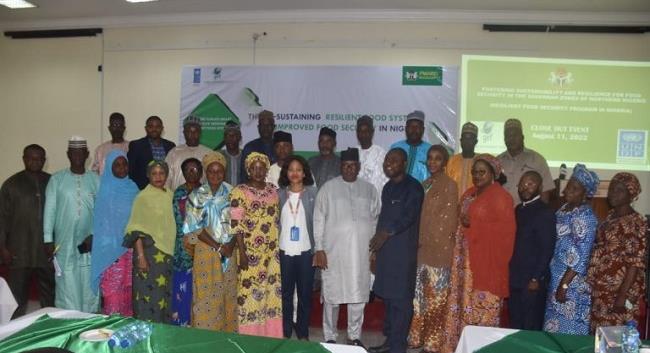The UN Development Programme has commended Nigerian Government’s efforts in promoting climate resilience agriculture and enhancing food security.

This was the thrust at the Close-Out Event of the Resilient Food Security Programme of the Global Environment Facility (GEF) project in Abuja on Thursday, August 11, 2022.
UNDP Deputy Resident Coordinator, Mr Lealem Dinku, said the GEF project had laid the foundation for climate change response in the country through the development of national food security policy and institutional structures.
The five-year project was implemented in seven states of Adamawa, Gombe, Nasarawa, Benue, Jigawa, Kano and Katsina.
Dinku noted that with sustainability, recurring food security situations would be addressed in a transformative manner for capacity of women, communities and institutions in the country.
He said the impact of climate change was widespread and felt through persistent droughts, extreme heat, flooding and erratic rain patterns, among others.
“Under this project, great results have been achieved so-far in tackling food insecurity in Nigeria. More than 90,000 direct jobs and 800,000 indirect jobs has been created through various livelihood and income generating activities.
“Moreover, more than 50,000 women have been empowered through the project’s climate-smart agriculture and livelihood interventions with both on-farm and off-farm income generating activities.
“And through the land restoration efforts, over 100 hectares of degraded and soil erosion land has been restored,” he said.
Representative of the Federal Ministry of Agriculture, Mrs Iyabo Mustapha, said climate change had impacted food systems in the country in immeasurable measure.
Mustapha said through the GEF project, the capacity of smallholder farmers was built on climate resilience agriculture, saying this had also promoted food security in the country.
While commending the UNDP on the partnership, Mustapha stressed the need for benefiting states to sustain successes recorded.
Mr Mohammed Tukur, GEF National Project Coordinator, said the Resilient Food Security Programme had proven to be very effective in boosting the adaptability of small-holder farmers in managing climate change.
He said the project had lifted many people out of poverty and ensured food security, linking successes to lessons from the Integrated Approach Pilot (IAP) theme.
“The Federal Ministry of Agriculture and Rural Development is appreciative of the ongoing support and dedication of all the RFS partners and state project teams as they collaborate with local communities to take action against land degradation and face long-term solutions to food security in Nigeria,’’ Tukur said.
Hajiya Salamatu Garba, Executive Director, Women Farmers Advancement Network, said the project had reflected that, with climate-resilience programmes and policies, Nigeria could meet its food security targets sustainably.
According to her, there is need for sustaining the gains of the programme through community ownership.
Garba also said implementing agencies ought to sustain the gender aspects of the project, saying women empowerment means all-round development.
“We must think of how to manage scalability and sustainability of the project, there is need for extension workers to hand them over to peer leaders and communities,’’ she said.
By Bukola Adewumi
